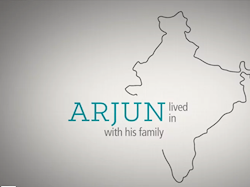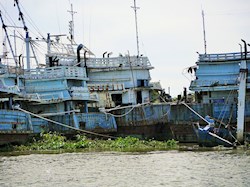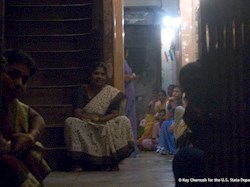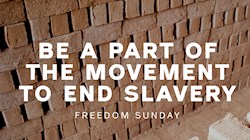(Author’s Note: The following account was written by me several years ago after my visit to a government home for trafficking survivors in an Asian country. I have changed the names and a couple of minor details to protect the ongoing work in this location. I was a bit raw when I wrote this. Now, years later, I understand conditions in this home have improved. Nonetheless, my friends inform me the conditions are still very poor.)
"Inmates"
Today, I went to the regional Government Home for Girls located outside the mega city. With me was Anya, a respected psychologist from a major anti-trafficking organization and her office driver, Apan. This was the place where girls from a recent rescue operation by Anya’s organization had been placed by government authorities in the aftermath of the raid.
We went in the office SUV. It was good we took a four wheel drive vehicle because it had rained in a deluge. Traffic, even though we were out in the middle of nowhere, was terrible. Bicycle carts, pedestrians and huge trucks all trying to squeeze through the same impossibly narrow, heavily flooded streets. Apan, a young man with a daughter the same age as my youngest, is an office driver. He somehow got me and Anya through the labyrinthine back-water route to the home. We made the trek there to see how we could help provide for the basic needs of the 400 girls at the facility.
On the way, Anya told me what she knew about the Government Home. She said most of the girls had been stuck there for a long time. A hint of this was found in the wording of the police letter we carried authorizing our visit. The letter referred to the girls as 'inmates.' Not ‘survivors’ or ‘beneficiaries’ or even ‘victims’. ‘Inmates.’
There is No One to Claim Them
I was told these survivors end up in the Government Home after the rare cases when they escape or are rescued from brothels, or otherwise when the police find non-trafficked juvenile girls in desperate need of care and no families to claim them. In many trafficking cases the inmates of Government Home are being held as material witnesses of crimes in which they themselves are the victims. Perversely, their perpetrators make bond and go free, the case then languishes for years, and the victims are effectively incarcerated.
Oh, I almost forgot. Anya also told me a minor girl was beaten to death inside the walls of the Government Home by another inmate just a few weeks ago.
Anya’s organization has been fighting to get the girls they recently rescued paced into a better a private home, but the advocates of the brothels are fighting back tooth-and-nail, through surrogates. The traffickers want the girls back for their own purposes. Understandably, these teenage victims are not happy about being in the Government Home. They don't really understand what is happening to them, or what is going to become of them. More practically, like the rest of the inmates, they told Anya they now have lice.
We've Arrived
The trip took about two hours one way, though we only traveled about 20 miles. We arrived outside the Government Home compound and waited to sign in the visitor log so our vehicle could pass through the black iron gates. The rain had mostly stopped but still the small lake of tepid brown water in which our car was parked was only starting to slowly recede. From the front seat of the air-conditioned SUV, I stared out the windshield at the high orange plaster walls that surrounded the place. It looked mostly like one of many jails I visited in my prior life as a narcotics prosecutor. Along the top of the walls were big black wrought iron hooks and shards of broken glass set in concrete. I noticed immediately a peculiar feature: the pointy end of the hooks were all turned the wrong way, if they were intended to keep people from breaking into the building. They were turned facing inwards.
Through the gate and behind the walls of the Government Home, the physical premises were not as dilapidated as I had feared. At least the building was not falling down. Nonetheless, it was a horrendous place to keep anyone, let alone children. Mosquitos were everywhere with not a screen or net in sight. In this country, that means a serious risk of malaria and dengue fever. The girls-inmates-victims don't even have a table to eat dinner on. Their beds were sheets of flat, rusted iron with some bedding rolled up on top. Their bedding, undoubtedly, is also infested with lice. I am told that the girls put a mixture of kerosene and coconut oil into their hair to try to control the lice. As I write this my head itches, but I think it's just psychosomatic.
They say that a doctor comes once a month to the Government Home, but we are sure he is a doctor only because we hear that he wears a stethoscope. But as far as I can tell this doctor is doing nothing for the girls. Apan joked that this guy just uses the stethoscope to check to see if the inmates still have a heart beat.
I had heard that the oldest 'girl' in the facility would be about 35 years old, but it turned out I was wrong. The oldest inmate, I’ll call her Joyce, is about 48 years old. She was placed in the home as a juvenile in 1967. That was the year I was born.
Born There
I was unprepared for one particular inmate of the Government Home: a little girl I’ll call Roupi. She was admitted to the Home by a surprising route: She was born there. Her mother is one of the inmates. She thought I was a “hoot” because of my white skin and the fact that I stand about 3 feet taller than everyone else. She kept pointing and laughing as she sat on the floor, trying to scrape the last scraps of food out of a cup and bowl in her lap.
To me, Roupi did not look old enough to go to kindergarten. I thought she was about 4 years old. But after I smiled at her and goofed a bit to make her laugh, I realized she seemed older somehow. Frankly, it took me a minute to process the picture. She had very short black hair, big eyes and a wide smile. She wore a dirty white tunic. But I began to suspect there was something physically wrong with her. She moved just a little too slowly. She seemed like she had difficulty with fine motor skills. I noticed her slow speech, her skinny and bowed legs, her slightly distended abdomen. It took just a few moments for me to see the obvious, horrible truth: Roupi has rickets. She is malnourished. She has been malnourished for a long time. She also may have some kind of brain damage. Then came an even more impossible realization: Roupi’s rickets are caused by malnourishment and lack of sunlight, because the Government Home for Girls is the only place she has ever lived.
Roupi smiled at me and laughed as sweetly as you could imagine, pointing and laughing while I aped for her. She loved how I pretended to be so surprised that anyone would find my appearance so amusing. I really wanted to pick her up. She would have loved it, but I did not want to catch lice. Now, back at Anya’s office, I really wish I had.
Bringing in Supplies
So, Anya’s organization has decided they are bringing supplies to the Government Home, to try to improve conditions. They will be taking fire extinguishers, lice treatments, tables and chairs, and lots of other things. Really it’s the government’s job to do this kind of thing but, obviously, the system is seriously broken. Anya’s group is also going to send people to the home on a regular basis to provide services, like trauma counseling and education. This seems wise. Sending supplies is useless unless someone goes along to make sure it actually reaches the people for whom it is intended.
A long time ago when I was a boy, my Dad told me that sometimes you see situations where you either have to laugh or cry. I found myself doing both. Laughing with disbelief at these conditions, and shedding tears of sadness for the souls in that place. Meanwhile, the events of the day have reinforced a growing suspicion on my part.
The real problem here is not poverty. The problem is the absence of love for these survivors.
Topics:
Rescue,
Sex Trafficking,
Aftercare,
Women & Girls












